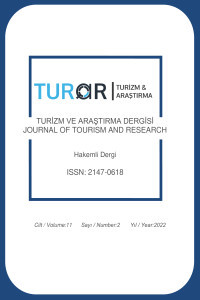GÜNLÜK TUR PROGRAMLARI OLUŞTURMADA VERİ MADENCİLİĞİ: A GRUBU SEYAHAT ACENTASI ÖRNEĞİ
Enformasyon sistemleri seyahat endüstrisinde yaygın olarak kullanılmaktadır. Enformasyon sistemleri seyahat acentalarının sunmuş oldukları ürün ve hizmetlere ait yüksek hacimde veriyi depolamaktadır. Seyahat ürün ve hizmetlerinin hazırlanması, tanıtım ve pazarlamasında karar vericilere yardımcı olabilecek veri içinde gizli, anlamlı, potansiyel olarak kullanışlı ve değerli bilgilerin depolanan veri yığını içinden çıkartılıp, ilgili alanlarda kullanılması günümüz rekabet koşullarında seyahat acentaları için vazgeçilmezdir
Anahtar Kelimeler:
Tur programları, veri madenciliği, birliktelik kuralları
THE USE OF DATA MINING TO CREATE A DAILY TOUR PROGRAMS: A SAMPLE OF A GROUP TRAVEL AGENCY
Information technology is widely used in travel industry. Information systems are storing large volumes of data related with the products and services which travel agencies offer. In today's competitive environment, it is indispensable for travel agents to find out meaningful and potentially useful and valuable information from data stored as batch which help decision makers to use of preparation and marketing of travel products
Keywords:
Tour programs, data mining, association rules,
___
- Akgün, A. (2012), Seyahat Acentalarında Veri Madenciliği: Antalya Bölgesinde Bir Uygulama,
- Yayınlanmamış Yüksek Lisans Tezi, Akdeniz Üniversitesi, Sosyal Bilimler Enstitüsü, Antalya Baysal, A. C., (2008), “Bayi Değerlendirmesi İçin Veri Madenciliği Uygulaması” Yayınlanmamış
- Yüksek Lisans Tezi, İstanbul Teknik Üniversitesi, Fen Bilimleri Enstitüsü, İstanbul Bose, I. (2009), “Data Mining in Tourism” IGI Global, ss.936-938.
- Byrd, E.T. ve Gustke L. (2011), “Using decision trees to identify tourism stakeholders” Journal of
- Place Management and Development, Vol. 4 No. 2, ss.148-168. Bloom, J. Z. (2004), “Tourist Market Segmentation With Linear and Non-Linear Techniques”
- Tourism Management, ss.723–733. Čech, P. ve Bureš V. (2009), “Advanced Technologies in e-Tourism” 9th WSEAS International
- Conference on Applied Computer Science. USA : World Scientific and Engineering Academy and Society (WSEAS), ss. 85-92. Choi, T.Y. ve Cho V. (2000), “Towards a Knowledge Discovery Framework For Yield
- Management in The Hong Kong Hotel Industry” Hospitality Management, ss.17-31. Çuhadar, M., Güngör İ. ve Göksu A. (2009), “Turizm Talebinin Yapay Sinir Ağları ile Tahmini ve Zaman Serisi Yöntemleri ile Karşılaştırmalı Analizi:Antalya İline Yönelik Bir Uygulama”
- Süleyman Demirel Üniversitesi, İktisadi ve İdari Bilimler Fakültesi Dergisi, C:14 S.1, ss.99-114. Hoontrakul, P. ve Sahadev S. (2008), “Application of Data Mining Techniques in The On-Line
- Travel Industry” Marketing Intelligence & Planning, Vol. 26 No.1, ss.60-76. Junping, D., Min Z. ve Xuyan T. (2008), “The Realization of Distributed Sampling Association
- Rule Mining Algorithm in Tourism” World Congress on Intelligent Control and Automation, ss.183-187. Liao, S., Chen Y. ve Deng M. (2010), “Mining customer knowledge for tourism new product development and customer relationship management” Expert Systems with Applications, ss.4212–
- Lim, G.G., et al. (2010), “An Exploratory Study of The Weather and Calendar Effects on Tourism
- Web Site Usage” Emerald Group Publishing Limited, Vol. 34 No. 1, ss.127-144. Lin, C. ve Huang Y. (2009), “Mining Tourist Imagery to Construct Destination Image Position
- Model” Expert Systems with Applications 36, ss.2513–2524.
- Liou, J.J.H., Yen L. ve Tzengm G. (2009), “Using Decision Rules to Achieve Mass Customization of Airline Services” European Journal of Operational Research, ss.680–686.
- Magnini, V.P., Honeycutt, E. D. ve Jr. ve Hodge S. K. (2003), “Data Mining for Hotel Firms: Use and Limitations” Cornell Hotel and Restaurant Administration Quarterly, ss.94-105.
- Maimon, O. ve Rokach L. (2010), Data Mining and Knowledge Discovery Handbook. New York:
- Springer Science+Business Media. Mirela, D., Tiberiu S. ve Adina B. (2009), “Toward A Distributed Data Mining System For
- Tourism Industry” Annals of Faculty of Economics, vol. 4, issue 1, ss.922-926. Nagadevara, V. (2008), “Improving the Effectiveness of Hotel Loyalty Programs through Data
- Mining” Global Cases on Hospitality Industry, ss.487-499. Şentürk, A. (2006), Veri Madenciliği Kavram ve Teknikler. Bursa: Ekin Yayınevi.
- Öğüt, A., Güleş, H. ve Çetinkaya, A., (2003), Bilişim Tekonolojileri Işığında Turizm İşletmelerinde
- Yönetim. Ankara:Nobel Yayıncılık. Öğüt, S. (2005), “Veri Madenciliği Kavramı ve Gelişim Süreci” Veri Madenciliği Paneli, İstanbul, 10.
- Özkan, Y. (2008), Veri Madenciliği Yöntemleri. İstanbul: Papatya Yayıncılık.
- ISSN: 2147-0618
- Yayın Aralığı: Yılda 2 Sayı
- Başlangıç: 2012
- Yayıncı: Toleyis Sendikası
